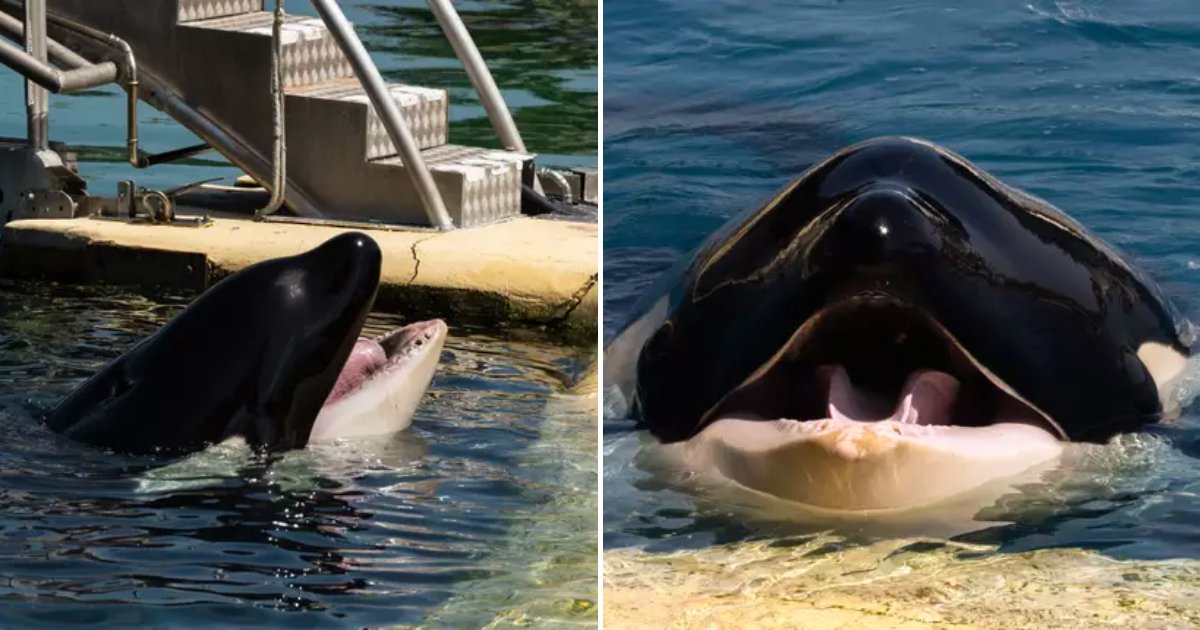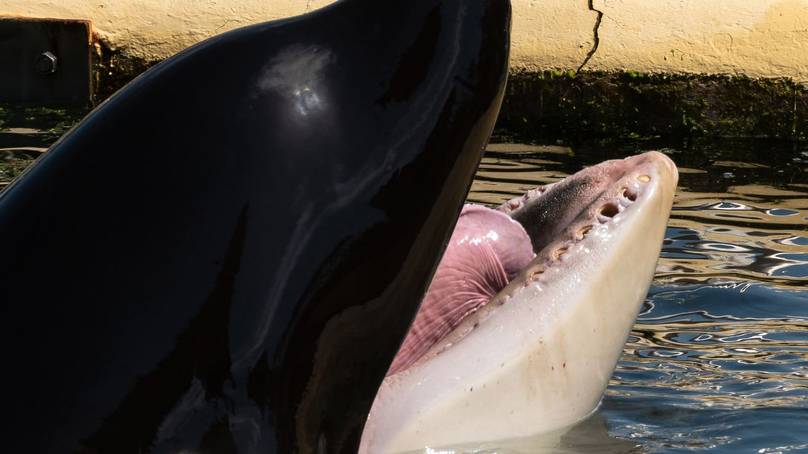News
Captive Orca Suffers Near-Complete Tooth Loss, Constant Pain While Confined in Aquarium
A captive Orca named Inouk has been kept in such reprehensible conditions that his teeth have almost entirely been lost due to him gnawing at his enclosure.

(TMU) – Animal rights advocates are expressing concern about a Orca named Inouk who has been kept in such reprehensible conditions that his teeth have almost entirely been lost after the orca as driven to incessantly gnaw at his enclosure.
French animal rights group One Voice released shocking images showing Inouk’s dire dental state resulting from his prolonged, unnatural confinement in Marineland Antibes, a controversial amusement park in the south of France, reports LADBible.

As of January, 46 aquatic mammals – including beluga whales, orcas, and a newborn bottlenose dolphin – have died at Marineland since the park was founded, drawing sharp criticism and boycott calls from opponents of cetacean captivity.
“The only killer whales in France are at the Marineland Park in Antibes,” One Voice explained. “Inouk is special because he has eaten away the walls of the pool to the pool liner gel. He is in constant pain. The main thing that we denounce is him not being able to live as he should, and the physical consequences of his mental suffering.”
The adult male orca has long been the subject of campaigners demanding his freedom. Inouk suffers from a collapsed dorsal fin and swims in circles, indicating grave stress, poor health and trauma. He also bites on toys placed in his tank and the walls of his enclosure.
#inouk has a dorsal fin collapse like in wild because he spend time at surface. It’s gravity because it’s made of collagen. Bad teeth like some in wild because he was fragile as calf and he has no hand to catch what he want. #seaworld #marineland pic.twitter.com/p8nWIz78fs
— Mermaid Fight (@CarolineLegent) July 8, 2019
“In summary, Inouk suffered and likely continues to suffer from tooth loss, tooth fracturing, and from teeth with exposed pulp,” campaigners from One Voice said last year. “Inouk likely suffers from acute and chronic stressors associated with unnatural confinement. In effect, he has a reduced quality of life due to captivity.”
One Voice has demanded an end to breeding programs in aquariums due to the high mortality rate in such confined conditions. They also are demanding that the French government ban the sale of wild marine mammals that should be free to live in the wild.
The group says they were supposed to hold a meeting with French officials on Thursday, but authorities postponed the meeting without explanation “to a future date,” LADBible reports.
Killer Whale Loses All Its Teeth Gnawing At Enclosure@ladbiblehttps://t.co/XFaIzaWTvu
"The only killer whales in France are at #Marineland #Antibes. Inouk has eaten away the walls of the pool to the pool liner gel. He is in constant pain~@onevoiceanimal #SaveINOUK #Blackfish— Orca S※O※S (@OrcaSOS) July 11, 2020
“These animals are highly intelligent and need to be in the ocean. A pool can never replace their natural habitat,” One Voice founding president Muriel Arnal said. “In the wild they would swim a hundred miles a day. Here, muscles are weak and they are bored.”
“They are constantly being medicated, they fight amongst each other, but in the ocean they would be able to flee,” she added.
Mothers are also routinely separated from their babies, heavily impacting the aqautic mammals’ mental health. Orcas live in tightly-knit family groups with sophisticated and unique cultures that are passed down from generation to generation, researchers have found.
I don't mind Marineland's trainer dragging John Hargrove but I do mind him trying to downplay the severity of Inouk's teeth (or his lack thereof). Inouk has no teeth left. Not a single one. Hazel told me he used to vomit so frequently that his stomach acid destroyed them all. pic.twitter.com/3vzyVW5fnG
— ????? ? (@Pilo2Lilo) May 26, 2019
Additionally, killer whales’ suffering is an acute concern because their intelligence exceeds that of great apes like gorillas, chimpanzees and bonobos, while they are also highly social animals that have their own language with dialects that evolve based on their environments, just like humans. The highly self-aware mammals have the second-largest brains of any creature on the planet.
One voice has urged that the whales be kept in protected oceanic sanctuaries where they are free to swim long distances in straight lines rather than constantly swim in circles, and where the apex predators are free to hunt sea birds, squid, octopuses, fish, and other maritime wildlife that they subsist on.
Orcas are genetically built to live, migrate, and thrive in the vast openness of the ocean, where they swim an average of 40 miles per day – which is a matter of necessity more so than ability, according to National Geographic.
“If you have evolved to move great distances to look for food and mates then you are adapted to that type of movement, whether you’re a polar bear or an elephant or an orca,” said Naomi Rose, a marine mammal scientist at the Animal Welfare Institute in Washington, D.C. “You put [orcas] in a box that is 150 feet long by 90 feet wide by 30 feet deep and you’re basically turning them into a couch potato.”
One voice is suing French authorities for turning a blind eye to orcas’ suffering. The group is demanding €500,000 (USD $565,800) that they hope to use to set up a marine sanctuary for the killer whales.
Typos, corrections and/or news tips? Email us at Contact@TheMindUnleashed.com
